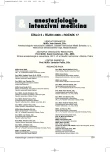-
Medical journals
- Career
Attitudes of intensivists to limiting therapy and end of life decision in the Czech Republic – a national study
Authors: R. Pařízková 1; V. Černý 1; K. Cvachovec 2; I. Novák 3; V. Šrámek 4; D. Nalos 5
Authors‘ workplace: Klinika anesteziologie, resuscitace a intenzivní medicíny UK v Praze, LF v Hradci Králové a Fakultní nemocnice Hradec Králové 1; Anesteziologicko-resuscitační klinika 2. LF UK a Fakultní nemocnice v Motole, Praha 2; I. interní klinika UK v Praze, LF a Fakultní nemocnice, Plzeň 3; Anesteziologicko-resuscitační klinika LF Masarykovy univerzity a Fakultní nemocnice u sv. Anny v Brně 4; Anesteziologicko-resuscitační oddělení, Masarykova nemocnice, Ústí nad Labem 5
Published in: Anest. intenziv. Med., 17, 2006, č. 5, s. 251-260
Category: Intensive Care Medicine - Original Paper
Overview
Objective:
The purpose of the study was to obtain information about the attitudes of doctors working on ICUs in the Czech Republic to limiting therapy and end of life decisions (EOLD).Design:
Prospective, multi-centre, observational study.Setting:
ICUs in tertiary care hospitals.Materials and Methods:
Questionnaires were posted to members of the Czech Society of Anaesthesiology and Intensive Care on their attitude to limiting therapy in patients admitted to ICUs.Results:
870 posted questionnaires yielded a response rate of 26%. 90% of the physicians considered limiting therapy in terminally ill patients as acceptable, 51.4% agreed with terminal respiratory weaning and 19.1% with euthanasia. EOLD may be undertaken by the competent patients themselves. 96% of responders considered the physician as the key person in EOLD for the incompetent patient. 28.9% and 43% of physicians respectively would include the nurse and the family in the decision-making process and 36.9% of physicians would respect the family’s wishes in cases of differing opinion. During withholding therapy most physicians would agree with the maintenance of analgesia, sedation and infusion therapy. A written EOLD order was recorded in the patient chart in 73%. Lack of privacy and the absence of family members were considered a key obstacle to assuring dignified death.Conclusion:
The study presents yet unpublished data regarding the attitude of the Czech Republic intensivists to the limitation of therapy and EOLD. Limitation of therapy was acceptable for the majority of responders whereas terminal respiratory weaning was refused by half of them. The absence of privacy and impersonal environment are the main obstacles to dignified dying in the ICU environment.Key words:
limitation of therapy – intensive care
Labels
Anaesthesiology, Resuscitation and Inten Intensive Care Medicine
Article was published inAnaesthesiology and Intensive Care Medicine

2006 Issue 5-
All articles in this issue
- Administration of COX-2 inhibitors modifies the course of postoperative delirium in cardiac surgery patients
- Duration of rocuronium-induced neuromuscular block predicted by its dose and onset time: a prospective study
- Fuzzy logic in anaesthesiology as a way of thinking and a tool for practical applications
- Attitudes of intensivists to limiting therapy and end of life decision in the Czech Republic – a national study
- Limitation of therapy in patients on ICU – a one-day national study
- Extreme hypoxic lactaemia in patients on critical care – prognosis, therapeutic options and their limitations
- Anaesthesiology and Intensive Care Medicine
- Journal archive
- Current issue
- Online only
- About the journal
Most read in this issue- Extreme hypoxic lactaemia in patients on critical care – prognosis, therapeutic options and their limitations
- Limitation of therapy in patients on ICU – a one-day national study
- Fuzzy logic in anaesthesiology as a way of thinking and a tool for practical applications
- Administration of COX-2 inhibitors modifies the course of postoperative delirium in cardiac surgery patients
Login#ADS_BOTTOM_SCRIPTS#Forgotten passwordEnter the email address that you registered with. We will send you instructions on how to set a new password.
- Career

